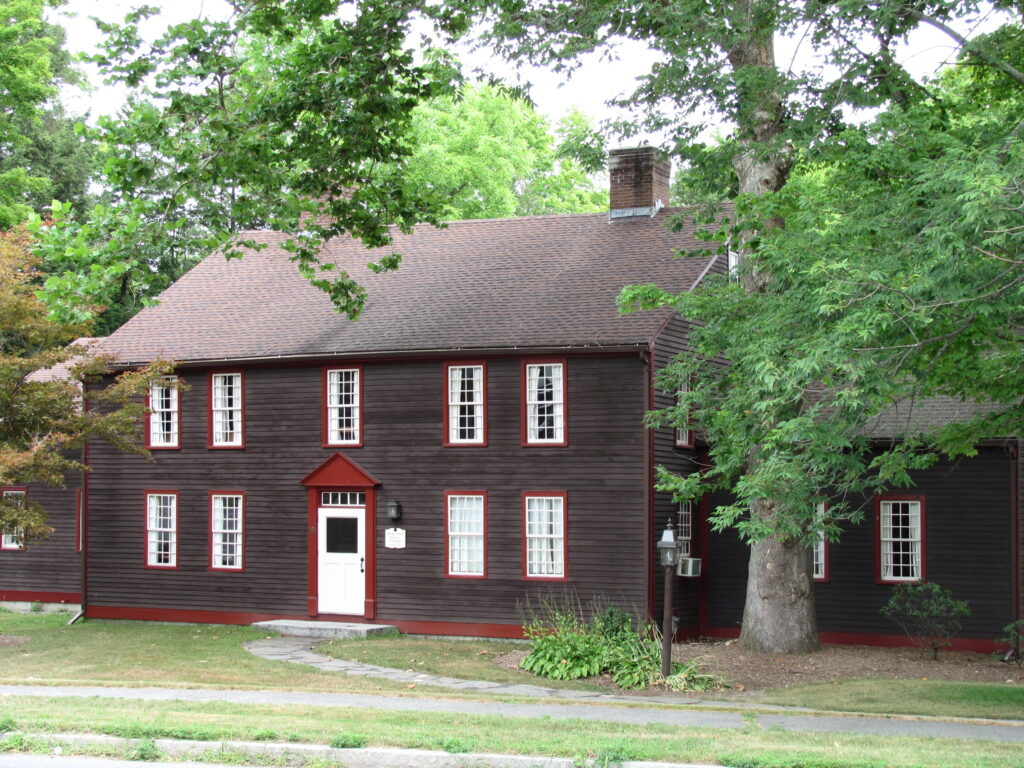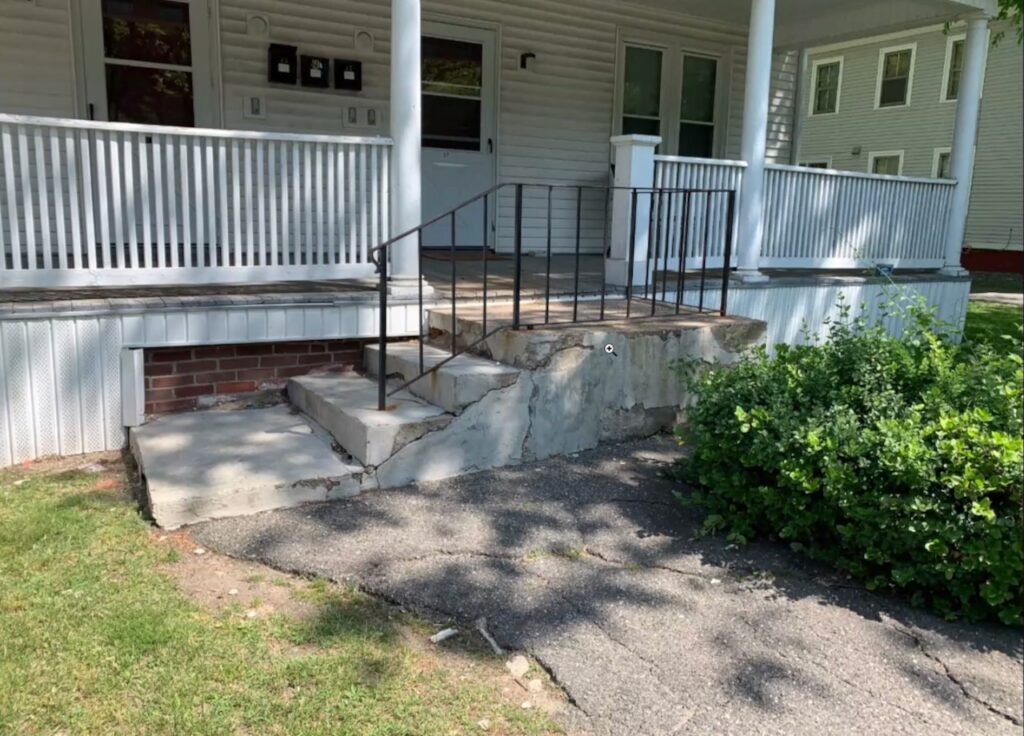Local Historic District Commission Considers Certificates Of Appropriateness, East Amherst Historic District, And Regulation Of Parking Lots

The Dickinson-Baggs Tavern is located in Amherst's East Village Historic District and is listed on the National Register of Historic Places. Photo: John Phelan /Wikipedia (Creative Commons)
Report on The Meeting Of The Local Historic District Commission, July 17, 2023
This meeting was held over Zoom and was recorded.
Present
Nancy Ratner (Chair),Karin Winter, Greta Wilcox, Bruce Coldham, Nicole Miller,Steve Bloom, and Elizabeth Sharpe
Staff: Nate Malloy (Senior Planner)
Materials For Replacement Of Front Steps Raise Questions
Three Certificates of Appropriateness were awarded, and a fourth application continued because of need for more information. The first two requests for eight approximately four-foot tall downcast driveway lights at 38 Gray Street and a heat pump compressor at 17 Seelye Street were triggered by applications for electrical permits. The heat pump compressor will not be visible from the street. A third certificate was granted for two propane tanks behind the house at 216 Lincoln Avenue to serve an electrical generator on the north side. The generator measures about 24 inches by 30 inches is of a light beige color and is screened by mature rhododendrons.
While the certificates for two of these three permits were granted without the owner or owner’s agent being present, the lack of a representative for the application for replacing concrete front steps at 47-49 Fearing Street was more problematic.

No one was present to answer questions from the commission about the materials and design. The existing concrete covered stone steps descending parallel to the porch are in very poor condition. The owner proposes to replace them with Trex fabricated decking steps with railings to match with no description as to the proposed color or style of the materials. Trex is wood alternative decking made from recycled materials. Commission member Bruce Coldham noted, from his experience as an architect, that Trex is not appropriate for this use, and he would prefer that the rails match those of the porch. Nichole Miller, a realtor, agreed and stated that it didn’t make sense to change the materials. This hearing was continued to August 21 at 3:00 pm so that the owner might appear. Commissioners noted that real estate agents must disclose to potential buyers of historical structures that changes may require commission approval.
Questions On How To Proceed To Establish East Amherst Local Historic District
Discussion continued about how to work together to fill out or edit the “Form B” architectural house descriptions required by the Massachusetts Historical Commission for the upgrade of the East Amherst National Historic District to a Local Historic District while complying with the Open Meeting Law (OML). A Drop Box where the documents could be accessible to the commissioners would not be available to the public as the OML requires. The Town Clerk fears that even though no deliberation would be taking place in reviewing the forms, members could talk to each other in pairs that might eventually result in a “chain” constituting a quorum which would violate the OML. Staff will continue to investigate a solution as there are no funds to hire a consultant. The existing information on each structure was compiled by Historical Commission members themselves more than forty years ago when the National District was formed and needs updating.
Can The LHDC Regulate Parking Lots?
Lastly the Commission members wanted to know whether they have any jurisdiction over parking lots in historic districts. Apparently, this conversation was triggered by a proposal for an apartment complex on Fearing Street that could require parking for thirty or more vehicles. By law, Historical Commissions cannot regulate a use. Walkways and driveways are noted in State law but parking lots are not mentioned specifically. Type of pavement, for example, might be regulated if the Commission could establish criteria for evaluating a proposal. Newton, Massachusetts has rules for parking areas that require the materials to be “historic” in character. Discussion on both these topics will be continued at a later meeting.

2 members of the commission can speak together and work on a document without violating Open Meeting Law. The problem of a chain of communications where 4 members inadvertently discuss a matter they will be later voting on can be avoided if the original 2 members do not communicate with others or only less than a majority. Open Meeting Law isn’t meant to paralyze a committee by requiring any and all work take place during a posted meeting. Sometimes members work on documents in pairs that they later bring to the whole group in a posted meeting where the public has access to the document. Think about the zoning amendments that Hanneke and D’Angeles have written, revised and presented. How would they do this if they could only talk to each other and write drafts during posted public meetings?
Correction: Ms Sharpe was absent from this meeting.
The Attorney General responded to an inquiry by one of the LHDC members regarding use of a Drop Box and
compliance with the Open Meeting Law with her opinion:
“Deliberation is defined as “an oral or written communication through any medium, including electronic mail, between or among a quorum of a public body on any public business within its jurisdiction; provided, however, that ‘deliberation’ shall not include the distribution of other procedural meeting [sic] or the distribution of reports or documents that may be discussed at a meeting, provided than no opinion of a member is expressed.” G.L. c. 30A, § 18. Inserting factual information in a shared document or uploaded factual documents, that do not constitute or contain an opinion of a public body member, for later discussion at a meeting, seems to fall within this exception and would not be considered improper deliberation.”
Sincerely,
Carrie Benedon (she/her/hers)
Assistant Attorney General
Director, Division of Open Government
Massachusetts Office of the Attorney General
(617) 963-2540